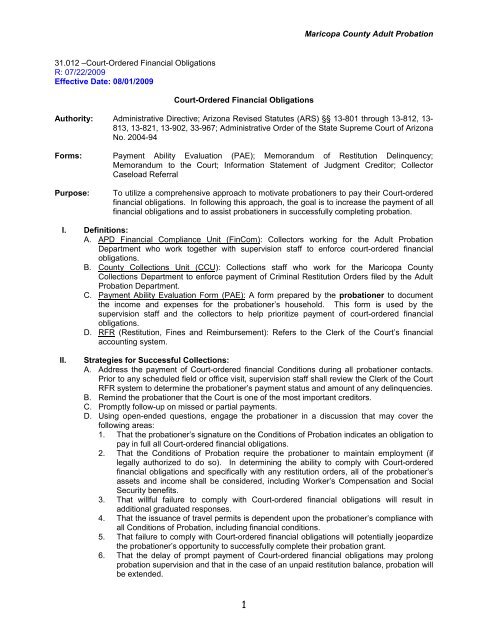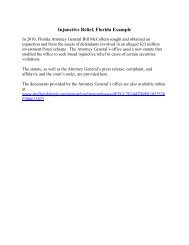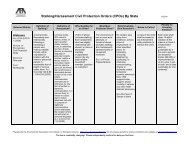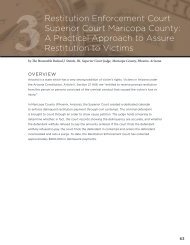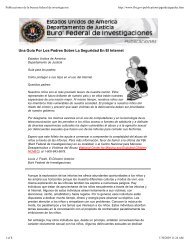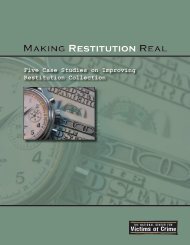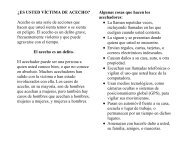Maricopa County Adult Probation 31.012 âCourt-Ordered Financial ...
Maricopa County Adult Probation 31.012 âCourt-Ordered Financial ...
Maricopa County Adult Probation 31.012 âCourt-Ordered Financial ...
Create successful ePaper yourself
Turn your PDF publications into a flip-book with our unique Google optimized e-Paper software.
<strong>Maricopa</strong> <strong>County</strong> <strong>Adult</strong> <strong>Probation</strong><br />
<strong>31.012</strong> –Court-<strong>Ordered</strong> <strong>Financial</strong> Obligations<br />
R: 07/22/2009<br />
Effective Date: 08/01/2009<br />
Court-<strong>Ordered</strong> <strong>Financial</strong> Obligations<br />
Authority: Administrative Directive; Arizona Revised Statutes (ARS) §§ 13-801 through 13-812, 13-<br />
813, 13-821, 13-902, 33-967; Administrative Order of the State Supreme Court of Arizona<br />
No. 2004-94<br />
Forms: Payment Ability Evaluation (PAE); Memorandum of Restitution Delinquency;<br />
Memorandum to the Court; Information Statement of Judgment Creditor; Collector<br />
Caseload Referral<br />
Purpose:<br />
To utilize a comprehensive approach to motivate probationers to pay their Court-ordered<br />
financial obligations. In following this approach, the goal is to increase the payment of all<br />
financial obligations and to assist probationers in successfully completing probation.<br />
I. Definitions:<br />
A. APD <strong>Financial</strong> Compliance Unit (FinCom): Collectors working for the <strong>Adult</strong> <strong>Probation</strong><br />
Department who work together with supervision staff to enforce court-ordered financial<br />
obligations.<br />
B. <strong>County</strong> Collections Unit (CCU): Collections staff who work for the <strong>Maricopa</strong> <strong>County</strong><br />
Collections Department to enforce payment of Criminal Restitution Orders filed by the <strong>Adult</strong><br />
<strong>Probation</strong> Department.<br />
C. Payment Ability Evaluation Form (PAE): A form prepared by the probationer to document<br />
the income and expenses for the probationer’s household. This form is used by the<br />
supervision staff and the collectors to help prioritize payment of court-ordered financial<br />
obligations.<br />
D. RFR (Restitution, Fines and Reimbursement): Refers to the Clerk of the Court’s financial<br />
accounting system.<br />
II.<br />
Strategies for Successful Collections:<br />
A. Address the payment of Court-ordered financial Conditions during all probationer contacts.<br />
Prior to any scheduled field or office visit, supervision staff shall review the Clerk of the Court<br />
RFR system to determine the probationer’s payment status and amount of any delinquencies.<br />
B. Remind the probationer that the Court is one of the most important creditors.<br />
C. Promptly follow-up on missed or partial payments.<br />
D. Using open-ended questions, engage the probationer in a discussion that may cover the<br />
following areas:<br />
1. That the probationer’s signature on the Conditions of <strong>Probation</strong> indicates an obligation to<br />
pay in full all Court-ordered financial obligations.<br />
2. That the Conditions of <strong>Probation</strong> require the probationer to maintain employment (if<br />
legally authorized to do so). In determining the ability to comply with Court-ordered<br />
financial obligations and specifically with any restitution orders, all of the probationer’s<br />
assets and income shall be considered, including Worker’s Compensation and Social<br />
Security benefits.<br />
3. That willful failure to comply with Court-ordered financial obligations will result in<br />
additional graduated responses.<br />
4. That the issuance of travel permits is dependent upon the probationer’s compliance with<br />
all Conditions of <strong>Probation</strong>, including financial conditions.<br />
5. That failure to comply with Court-ordered financial obligations will potentially jeopardize<br />
the probationer’s opportunity to successfully complete their probation grant.<br />
6. That the delay of prompt payment of Court-ordered financial obligations may prolong<br />
probation supervision and that in the case of an unpaid restitution balance, probation will<br />
be extended.<br />
1
<strong>Maricopa</strong> <strong>County</strong> <strong>Adult</strong> <strong>Probation</strong><br />
III.<br />
IV.<br />
Initial <strong>Probation</strong>er Contact: Upon the first contact with the probationer, supervision staff shall:<br />
A. Review all Court-ordered financial obligations with the probationer, including the total amount<br />
ordered by the Court, the monthly payment amount, the payment start date, and the<br />
subsequent due date of each monthly payment.<br />
B. Engage the probationer in a discussion of graduated responses that may be imposed when a<br />
payment is missed (see Section IV below).<br />
Monitoring Payment of Court-ordered <strong>Financial</strong> Obligations:<br />
A. Upon receipt of a new or transfer assignment, review the minute entry and Clerk of the Court<br />
RFR system for status of financial obligations. If a financial order lists the payment start date<br />
as “to be determined” or listed with a start date in the year 2049, supervision staff shall<br />
prepare the "Establish Payment Start Date" form found in the APD macros "Faxes for Field,"<br />
“Clerk of the Court faxes” and fax that form to the Clerk of the Court<br />
B. Engage the probationer in a discussion about the financial Conditions of <strong>Probation</strong> at initial<br />
interview with all new and transfer assignments. Prior to any scheduled field or office visit,<br />
supervision staff shall review the Clerk of the Court RFR system to determine probationer’s<br />
payment status and amount of any delinquencies.<br />
C. If the probationer is not current on payments whenever a contact is made, supervision staff<br />
shall discuss the probationer’s cognitive processes of how spending is prioritized and<br />
establish an agreed-upon payment amount. Supervision staff shall follow-up on this<br />
agreement after the agreed-upon due date.<br />
D. When payment is not received, supervision staff shall impose the following graduated<br />
responses within the specified time frames:<br />
1. If no payment is received within one (1) month of the payment due date, supervision staff<br />
shall direct the probationer in writing to complete a new or current PAE. Supervision staff<br />
shall review the PAE with the probationer and identify disposable income to be redirected<br />
to pay Court-ordered financial obligations.<br />
2. If no payment is received within two (2) months of payment due date, supervision staff<br />
shall direct the probationer in writing to attend Budget Class. If the two-month<br />
delinquency has accrued on a restitution order, in addition to directing the probationer to<br />
Budget Class, supervision staff shall refer the probationer to a collector for further<br />
financial coaching or education. A collector referral may be made via a Collector<br />
Caseload Referral form or by e-mail to the collector to include the following information:<br />
probationer name, all active case numbers, and current contact information for the<br />
probationer (phone number and address). The collector shall enter the probationer into<br />
the Tax Intercept Program if the probationer is two months delinquent in restitution.<br />
Supervision staff shall also notify the Court in accordance with Section V of this policy.<br />
3. If no payment is received within three (3) months of payment due date, supervision staff<br />
shall refer the probationer to a collector for further financial coaching or education. The<br />
referral shall include the information specified in IV.D.2.<br />
4. If the probationer has been monitored by a collector and no payment is received within<br />
six (6) months of payment due date, the collector shall complete and forward a Close of<br />
Interest form to supervision staff and refer the probationer back to supervision staff. A<br />
copy of the Close of Interest form shall be sent to the supervisor of the supervision staff.<br />
Supervision staff shall engage in a discussion of graduated responses with the supervisor<br />
that includes the determination of an appropriate course of action up to and including a<br />
Petition to Revoke (refer to APD Violation of <strong>Probation</strong> Policy) or Memo to the Court.<br />
E. The division director or designee may waive any of these graduated responses based on a<br />
staffing with the officer and supervisor. Situations where a waiver of graduated sanctions<br />
may be authorized include, but are not limited to cases where the probationer is hospitalized,<br />
chronically ill, or not authorized to work in the United States.<br />
1. In any situation where a waiver is granted, supervision staff shall verify the legitimacy of<br />
the reason.<br />
2. Based on a discussion of the situation with the unit supervisor and (if applicable) the<br />
division director, supervision staff may send a Memorandum to the Court documenting<br />
2
<strong>Maricopa</strong> <strong>County</strong> <strong>Adult</strong> <strong>Probation</strong><br />
the reason for a hiatus in payment, duration of hiatus, and any expected date at which<br />
payment will resume<br />
F. All actions regarding collection of financial obligations and any graduated responses imposed<br />
on the probationer shall be documented in APETS.<br />
V. Addressing Restitution Delinquency: Supervision staff shall send a Memorandum of<br />
Restitution Delinquency to the sentencing Court when the probationer has become delinquent in<br />
the amount equal to two full Court-ordered monthly payments (A.O. 2004-94).<br />
A. Supervision staff shall indicate to the Court the amount and duration of the delinquency and<br />
the probationer’s plan to address the delinquency.<br />
B. Supervision staff shall retain one copy of the Memorandum of Restitution Delinquency in the<br />
case file, provide one copy to the probationer, and send one copy to any opted-in victim.<br />
C. Supervision staff shall prepare a letter to the opt-in victim (available via APD macros)<br />
advising them of the efforts the APD <strong>Financial</strong> Compliance Unit will be taking to address the<br />
delinquency. This letter also advises the opt-in victim of his/her right to be heard if he/she<br />
objects to the plan to address the delinquency.<br />
VI.<br />
Modification of Payment Orders:<br />
A. Restitution: If supervision staff receives information from a victim, prosecutor, Clerk of<br />
Superior Court, or the Court, which indicates that the original restitution order should be<br />
changed in any manner, supervision staff may submit a Petition to Modify <strong>Probation</strong> <strong>Financial</strong><br />
Conditions after obtaining authorization from the division director.<br />
B. <strong>Probation</strong> Service Fee (PSF): Supervision staff may not request that the Court adjust the<br />
payment amount or frequency of payment or exonerate any delinquency or order of PSF<br />
unless the request is to increase the monthly PSF amount.<br />
1. For cases in which a probationer is reinstated to probation, supervision staff shall<br />
recommend to the Court that the total amount of the probationer’s accrued delinquent<br />
PSF be brought forward and ordered payable as a new Condition of <strong>Probation</strong>.<br />
2. Because the probationer should not pay duplicate PSF, supervision staff may request<br />
that the Clerk of Superior Court inactivate duplicate PSF by utilizing the following<br />
procedure:<br />
a. Using APD letterhead, prepare a memorandum to the Clerk of Superior Court<br />
Criminal <strong>Financial</strong> Obligations Unit (CFO) that identifies which cases are affected<br />
and which case for which PSF should remain active (if the probation grants have<br />
different expiration dates, supervision staff shall request PSF remain active for<br />
the probation grant that expires last). The memorandum must be signed by<br />
either the probation officer or supervisor.<br />
b. Supervision staff may either email or fax the memorandum to the CFO:<br />
E-mail address: CFOResponse@mail.maricopa.gov<br />
FAX: (602) 506-5127<br />
3. In circumstances where the probationer has a long-term or chronic medical or mental<br />
health condition (e.g. disabled, SMI diagnosis), supervision staff may staff a modification<br />
of PSF with the supervisor. However, any modification of PSF requires authorization<br />
from the division director.<br />
C. All other Court-ordered financial sanctions: Supervision staff may request that the Court<br />
adjust the total amount of payment, the monthly payment amount, or the start date of<br />
payment provided that the request is not prohibited by statute. These changes should only be<br />
made if supported by documentation obtained through the PAE.<br />
D. Establishing a start date for payments after incarceration: If a probationer has been<br />
incarcerated and the start date for financial obligations has not been determined, a form letter<br />
shall be prepared and sent to the Clerk of the Superior Court advising of the start date (using<br />
the APD Macros “Faxes for Field” “Establish Payment Start Date” form). The start date shall<br />
be delayed no longer than two (2) months after the probationer’s release from incarceration<br />
unless the Court has ordered a different period of time.<br />
3
<strong>Maricopa</strong> <strong>County</strong> <strong>Adult</strong> <strong>Probation</strong><br />
VII.<br />
Expiration or Early Termination of <strong>Probation</strong>:<br />
A. Restitution: if any amount of restitution is outstanding sixty (60) days prior to the scheduled<br />
termination of probation, supervision staff shall submit to the Court a Petition to Modify<br />
<strong>Probation</strong> requesting an extension of probation.<br />
1. For offenses committed on or after September 19, 2007, pursuant to ARS §13-902(C), a<br />
felony may be extended for up to five years and a misdemeanor may be extended for up<br />
to two years beyond the original probation grant.<br />
2. For offenses committed prior to September 19, 2007, pursuant to ARS §13-902(C), a<br />
felony may be extended for up to three years and a misdemeanor may be extended for<br />
up to one year beyond the original probation grant.<br />
3. Supervision staff preparing the Petition to Modify shall verify the date the offense was<br />
committed to determine the number of years that shall be requested in the Petition.<br />
Staff shall recommend the maximum allowable term for the extension.<br />
4. If the victim has opted in for post-conviction notification of probation matters, supervision<br />
staff shall advise the victim that an extension of probation has been submitted to the<br />
Court.<br />
5. If restitution is still owed at the end of the extended probation grant, supervision staff<br />
shall file a Criminal Restitution Order with the Court in favor of each person entitled to<br />
restitution in the amount of the unpaid balance of any restitution ordered (refer to APD<br />
Criminal Restitution Orders policy).<br />
B. All other Court-ordered financial obligations: If any Court-ordered financial obligations have<br />
an unpaid balance or have a delinquent balance upon the expiration of probation, supervision<br />
staff shall submit a Criminal Restitution Order with the Court for any unpaid balance or<br />
delinquent monies owed for PSF, fines, reimbursement, assessments, or incarceration costs<br />
no later than thirty (30) working days prior to the probationer’s scheduled completion date.<br />
The Criminal Restitution Order shall be filed with the Information Statement of Judgment<br />
Creditor with the Court in the total amount of the outstanding unpaid balance owed to the<br />
State (refer to APD Criminal Restitution Orders policy).<br />
-- END SECTION <strong>31.012</strong>: COURT-ORDERED FINANCIAL OBLIGATIONS --<br />
************************************************************************************************************************<br />
4


